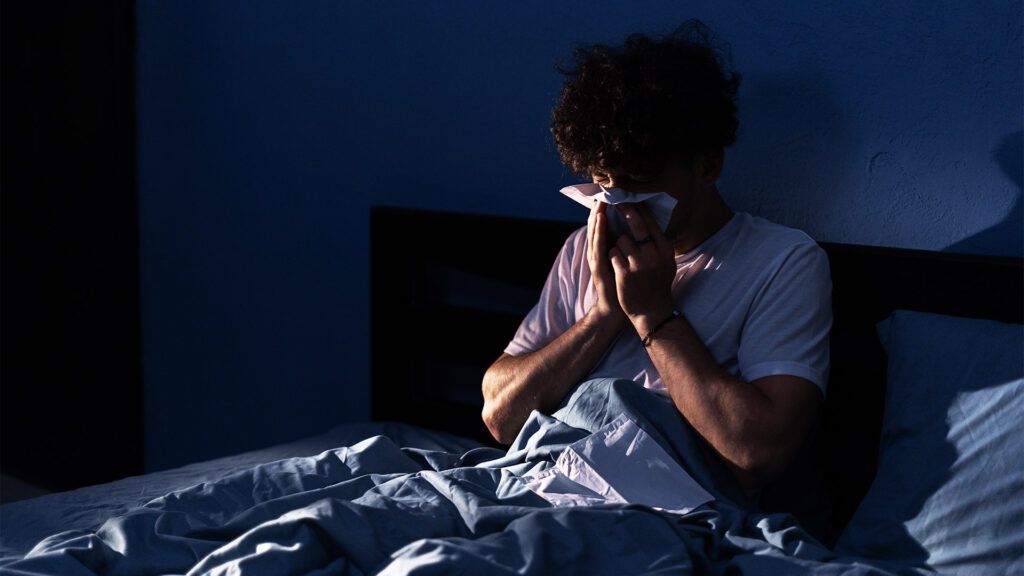Allergies may worsen at night due to natural circadian rhythms, increased nocturnal pollen counts, and environmental allergens. Lying down can also increase congestion.
People with respiratory allergies are familiar with persistent sneezing, itchy eyes, and nasal congestion which often accompany the condition. However, for some individuals, symptoms become more significant at night.
Those with allergies, such as hay fever or asthma, may find that lying down increases nasal congestion and stuffiness, making it challenging to get enough sleep. Other reasons for worsening symptoms at night may include the natural rhythm of certain immune cells and environmental allergens.
Some pollen counts can also be higher late at night and early in the morning.
This article examines the reasons for worsening allergies at night and when an individual should see a specialist for help and advice.

Several factors can contribute to worsening allergy symptoms during the nighttime hours.
Circadian rhythms
The body’s circadian rhythms play a
Learn more about circadian clocks and sleep disorders.
Environment
The environment itself can become a breeding ground for allergens.
Dust mites, pet dander, and mold thrive in bedding, carpets, and upholstery, which can intensify symptoms for individuals. Also, pollen counts can be at their highest during the late night and early morning hours, further complicating matters for those allergic to outdoor allergens.
Sleeping position
People may find that lying down increases their nasal congestion and stuffiness due to postnasal drip, which is when mucus drips from the nose down the back of the throat. This can start a cycle of coughing, to clear the throat, sniffling, and sore throat, making breathing and getting a restful sleep challenging.
Learn more about treating postnasal drip.
Nighttime allergy symptoms can vary widely, depending on the individual and the allergy. However, common symptoms may include:
- nasal congestion
- sore throat
- sneezing
- itchy or watery eyes
- increased coughing and wheezing
Also, if allergy symptoms interfere with a person’s sleep, they may experience a lack of concentration or feel excessively sleepy when awake.
There is a potential link between allergies and sleep apnea. Allergies may contribute to developing or exacerbating sleep apnea symptoms. The congestion and inflammation associated with allergies can narrow the airways, making breathing more difficult while sleeping.
Managing nighttime allergies requires a multifaceted approach.
Here are some tips to reduce bedroom allergens, alleviate symptoms, and promote better sleep:
- Allergen-proof the bedroom: Use allergen-proof covers on pillows and mattresses to minimize dust mites and pet dander exposure. Regularly wash bedding in hot water to kill allergens and wash or vacuum the floors and any rugs weekly. Keep pets out of the bedroom.
- Close windows: Reduce the amount of pollen entering the room by closing the windows.
- Use HEPA purifiers: Consider using high efficiency particulate air (HEPA) filters to remove airborne allergens.
- Dehumidifiers: Keep the humidity in the home below 50%, particularly in the bedroom. If there is an adjoining bathroom, run a fan for at least 15 to 20 minutes after showering.
- Nasal irrigation: Use saline nasal sprays or irrigation systems to clear nasal passages before bedtime.
- Allergy medications: Over-the-counter or prescription antihistamines and decongestants can help relieve symptoms. Consult a healthcare professional for guidance.
What is the best position to sleep in with allergies?
When experiencing nighttime allergies, sleeping in certain positions can provide comfort. For example, elevating the upper body with an extra pillow or an adjustable bed may help reduce nasal congestion and alleviate symptoms.
Some people may find sleeping on their back is preferable to avoid touching pillows with their face. However, for some, this increases postnasal drip.
If nighttime allergies persist despite self-care measures, or they significantly impact the individual’s quality of life, it is time to consult an allergist or immunologist. These specialists can conduct allergy testing to identify specific triggers and recommend personalized treatment options.
They may
Allergen immunotherapy provides lasting relief and even potential long-term remission of allergy symptoms. For these reasons, it is a valuable option for those managing persistent nighttime allergies.
Allergies may worsen at night due to natural circadian rhythms, indoor allergens, and nighttime pollen. People may experience nasal congestion, sneezing, and itchy eyes.
Although challenging, people can manage nighttime allergies by reducing allergens in their homes, using air purifiers, and considering allergy medications, when necessary. Sleeping with the upper body elevated may also help.
People with persistent allergies should seek specialist guidance for assessment and treatment.
